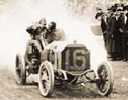Russell's Ramblings
by Russell Jaslow
NASCAR's Kangaroo Court
5/26/09
Rochester, N.Y.—Imagine this scenario. You are pulled over by a police officer. He asks for your license and registration.
"Did I do anything wrong officer?"
"Yes. You broke the traffic code."
"Which traffic code did I break?"
"We can't tell you that."
"But how do I know what I did wrong if I don't know what traffic code I broke? Can I see the list of traffic codes, so I know what not to break in the future."
"We see no reason why you need to see the list of traffic codes."
Sound ludicrous? That's exactly what happens in NASCAR.
NASCAR has accused Jeremy Mayfield of having a substance that is against their drug policy. However, they did not initially inform Mayfield what drug it was he took, finally relenting after Mayfield acquired the services of a lawyer. Even more astounding, NASCAR also does not publicly provide the list of banned substances, not even to the competitors themselves.
Now, I tend to never believe an athlete's excuses every time they are caught using a banned substance. We've seen the pattern of public denial time and time again in all sports. So, I'm not taking Mayfield's side. However, for a multi-billion dollar industry to not reveal the rules of the game is beyond any logic known to Mankind.
"That alone to me is ludicrous," said Dr. Charles Yesalis, a Penn State professor who spent 25 years researching drug testing. "That just kind of violates your sense of fair play. It never would fly in MLB or the NFL because they have a union. The drivers don't have a union, but if somebody did that to me I'd go get myself a nasty lawyer. What if somebody in management or ownership doesn't like you? They can use that as a weapon against you."
Which NASCAR already has a history of doing. All one has to do is recall the despicable treatment NASCAR gave Tim Richmond during his last years of his life. Not even knowing what was wrong with Richmond at the time, though probably guessing based on rumors, NASCAR devised a drug plan where none existed at the time specifically to get rid of Richmond.
Suddenly, they "found" a drug in Richmond's test and banned him from the sport. When Richmond demanded a new test, it was negative. NASCAR then admitted the first test merely revealed Advil and Sudafed. NASCAR however continued dragging Richmond's reputation through the mud, demanding full medical records before they would allow him back on the track.
Shortly after Richmond's death (which was revealed to be caused by AIDS), the New York Times reported Dr. Forest Tennant, the NFL's drug advisor, allegedly falsified drug tests for NASCAR to bar Richmond from racing.
Even if NASCAR is on the up and up in Mayfield's case, how are the competitors to know what to do whenever they seek medical treatment? Athletes will always go to a doctor who is familiar with the list of banned substances in their respective sports drug policy. It's common sense when messing around with your livelihood. NASCAR drivers and crew have no idea what they can and cannot put into their bodies. They don't know what traffic codes not to break.
NASCAR does themselves no good by not publishing the list by claiming it makes the program stronger because it gives the governing body more flexibility. Say what?! Flexible to nail anyone they want whenever they feel like it? NASCAR appears stuck in the thinking of a past era.
Today's corporate world has made a big push on values, diversity, and proper behavior in the workplace and during interaction with other companies, customers, and suppliers. They have found this change of attitude to raise employee morale, increase productivity, and win them more business.
However, NASCAR continues to operate as if it is still the 1950s in both their behavior and image. The majority of their employees, especially their most visible ones (Lesa Kennedy not withstanding), are white males. Bring in an outsider, like a woman, or worse yet, a black woman, and the results got very ugly. There are more Confederate flags at a NASCAR race than any other gathering including a Ku Klux Klan picnic.
This thinking also transcends to the treatment of their most valued employees, or as NASCAR always reminds everyone, their most valued independent contractors -- the drivers. Some of us are old enough to remember the intimidation and scare tactics companies used to keep their minions in place. NASCAR continues to do this with secret rules and hidden lists of banned drugs.
Speaking of secret rules and punishments, how about the suspension and fine levied against Carl Long Racing? A part-time field filler presented a car to tech with an engine that was .17 inches CID over spec. Yes, that's 17/100ths CID over out of a maximum allowed 358 CID engine. Illegal? Absolutely, no matter how small the margin. Punishable? Sure. Wrong is wrong.
But a $200,000 fine levied at the crew chief and 12-race suspensions for the crew chief, owner, and driver as well as losing 200 driver and owner points? For an infraction that isn't even remotely close to an advantage that other teams have tried to get away with in the past? Insane! Especially, during a time when NASCAR can least afford to lose teams. Do you think in your wildest imagination that sort of penalty would ever be levied against Dale Earnhardt, Jr. no matter how egregious the infraction might be?
"The fine is ridiculous," Bruton Smith said. "Why would you fine this man $200,000? What is it proving? I don't know Carl Long, but there's an injustice done there. It's cruel to try to ruin this man. It's just not right."
Just what did Carl Long Racing do to tick off NASCAR? That's the same question Mayfield may be asking. And the same question Richmond was probably asking as he lay dying in the hospital. And the same question many will continue to ask as long as NASCAR has their kangaroo court system.
Copyright © 2009 by and Deep Throttle. All Rights Reserved.
Russell's Ramblings Archive
| 



